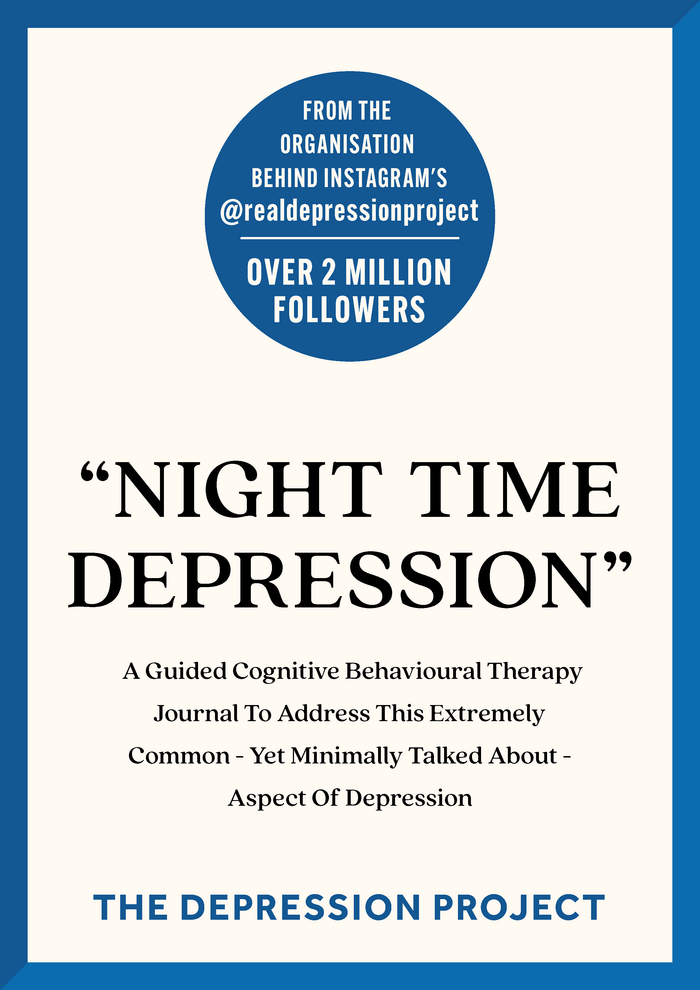“I lie in bed sleepless as my mind races. Negative thoughts, worrying thoughts, regrets about the past, dread for tomorrow. I wish I could turn it off but I can’t.”
If, like many people with depression, you can relate to this form of "depression at night", then in this blog post, we'd like to share with you a free excerpt from our "Night Time Depression" Journal to help you cope with- and overcome it.
Are you ready?
A major component of what we at The Depression Project refer to as “night time depression” is being so consumed with intrusive thoughts when you’re trying to fall asleep that you’re unable to do so (even if you’re tired). This is something that many people with depression can understandably relate to – since when you have depression, it’s extremely common to experience intrusive thoughts in the form of, for example:
- Rumination about the past or something that happened that day;
- Worrying thoughts, hopeless thoughts and/or dread about tomorrow / something else in the future;
- Negative, judgmental, critical thoughts about who you are as a person and/or something you’ve done / haven’t done.
In saying that, however, throughout the day and up until it’s time to go to sleep, what many people often find is that they’ll be at least partially distracted from their thoughts by whatever it is that they’re doing – such as, for example:
- Working;
- Taking care of their children;
- Attending to their chores and other day-to-day tasks;
- Scrolling through social media on their phone;
- Watching television after dinner.
However, while keeping busy can often distract people from their thoughts throughout the day, at night when they’re trying to fall asleep, there’s no longer anything to distract them, and as a result – BANG! They’ll suddenly find themselves bombarded with intrusive thoughts, and low and behold, they’re unable to fall asleep.
In particular, this explains why so many thoughts often surface at night time: because when it’s just you in the silent darkness trying to fall asleep, you’re forced to confront all of the thoughts that you’ve spent the day distracting yourself from.
And, if you can relate, you might be wondering:
If I’ve been able to suppress my thoughts all day, then why can’t I continue to do so?
Why do they have to come out at all?
Why can’t they just disappear so that I can get some sleep?
However, it’s important to note that one of the major functions our thoughts serve is to help us navigate our way through the world. For this reason, if we have a problem or something that’s troubling us, it’s natural for our thoughts to gravitate towards whatever that is – to try to process what’s going on and figure out a solution. Consequently, your thoughts cannot be suppressed forever – they need to come out. And, as soon as you stop “distracting yourself” at the end of the day, they inevitably will when you’re trying to fall asleep.
A Solution To This Form Of "Night Time Depression": Addressing Your Thoughts Before It’s Time To Go To Sleep
In order to solve this problem so that you don’t have so much difficulty falling asleep, instead of “distracting yourself” from your thoughts all day (whether consciously or unconsciously), we really encourage you to set aside time to be present with them and to process them – so that by default, you don’t end up doing so at the end of the night when you’re trying to fall asleep. In practice, you could do this by, for example:
- Talking to someone about what’s on your mind (such as a friend or a therapist);
- At one or more points throughout the day, removing all distractions, and giving yourself some time and space to be present with your thoughts;
- Setting aside some time to journal your thoughts.
End of free excerpt
We really hope you've found this free journal excerpt about "night time depression" helpful!
All our love,
The Depression Project Team.
P.S. If you'd like to learn more strategies to help you cope with and overcome "night time depression", then click the button below to learn more about the cognitive behavioural therapy-based journal that this free excerpt came from :)


